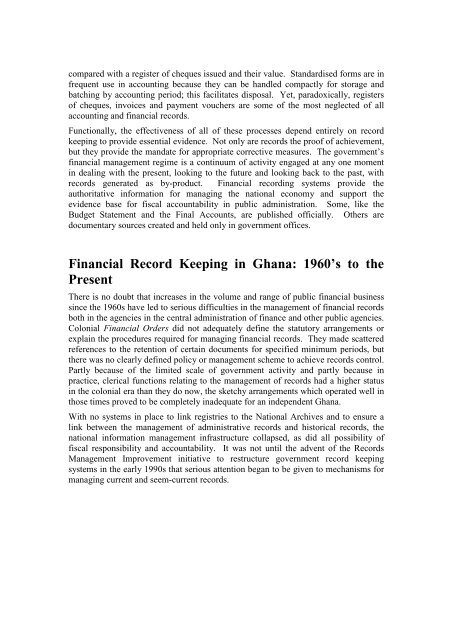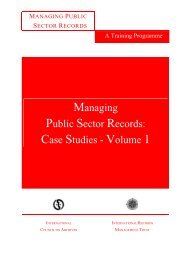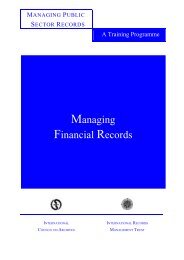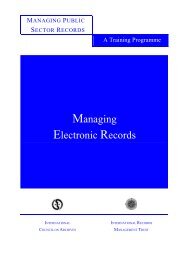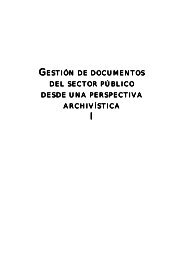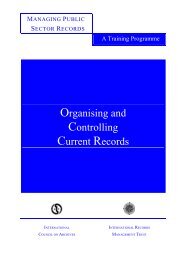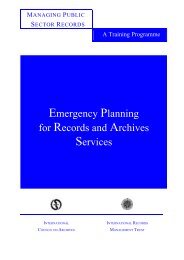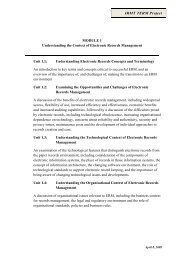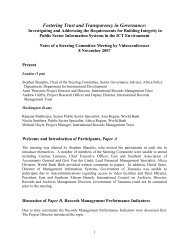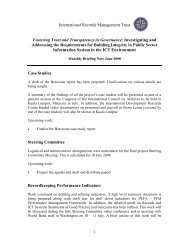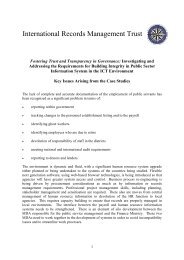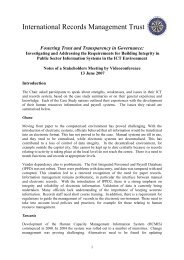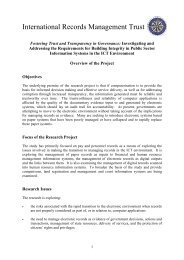managing public sector records: a study programme - International ...
managing public sector records: a study programme - International ...
managing public sector records: a study programme - International ...
Create successful ePaper yourself
Turn your PDF publications into a flip-book with our unique Google optimized e-Paper software.
compared with a register of cheques issued and their value. Standardised forms are in<br />
frequent use in accounting because they can be handled compactly for storage and<br />
batching by accounting period; this facilitates disposal. Yet, paradoxically, registers<br />
of cheques, invoices and payment vouchers are some of the most neglected of all<br />
accounting and financial <strong>records</strong>.<br />
Functionally, the effectiveness of all of these processes depend entirely on record<br />
keeping to provide essential evidence. Not only are <strong>records</strong> the proof of achievement,<br />
but they provide the mandate for appropriate corrective measures. The government’s<br />
financial management regime is a continuum of activity engaged at any one moment<br />
in dealing with the present, looking to the future and looking back to the past, with<br />
<strong>records</strong> generated as by-product. Financial recording systems provide the<br />
authoritative information for <strong>managing</strong> the national economy and support the<br />
evidence base for fiscal accountability in <strong>public</strong> administration. Some, like the<br />
Budget Statement and the Final Accounts, are published officially. Others are<br />
documentary sources created and held only in government offices.<br />
Financial Record Keeping in Ghana: 1960’s to the<br />
Present<br />
There is no doubt that increases in the volume and range of <strong>public</strong> financial business<br />
since the 1960s have led to serious difficulties in the management of financial <strong>records</strong><br />
both in the agencies in the central administration of finance and other <strong>public</strong> agencies.<br />
Colonial Financial Orders did not adequately define the statutory arrangements or<br />
explain the procedures required for <strong>managing</strong> financial <strong>records</strong>. They made scattered<br />
references to the retention of certain documents for specified minimum periods, but<br />
there was no clearly defined policy or management scheme to achieve <strong>records</strong> control.<br />
Partly because of the limited scale of government activity and partly because in<br />
practice, clerical functions relating to the management of <strong>records</strong> had a higher status<br />
in the colonial era than they do now, the sketchy arrangements which operated well in<br />
those times proved to be completely inadequate for an independent Ghana.<br />
With no systems in place to link registries to the National Archives and to ensure a<br />
link between the management of administrative <strong>records</strong> and historical <strong>records</strong>, the<br />
national information management infrastructure collapsed, as did all possibility of<br />
fiscal responsibility and accountability. It was not until the advent of the Records<br />
Management Improvement initiative to restructure government record keeping<br />
systems in the early 1990s that serious attention began to be given to mechanisms for<br />
<strong>managing</strong> current and seem-current <strong>records</strong>.


